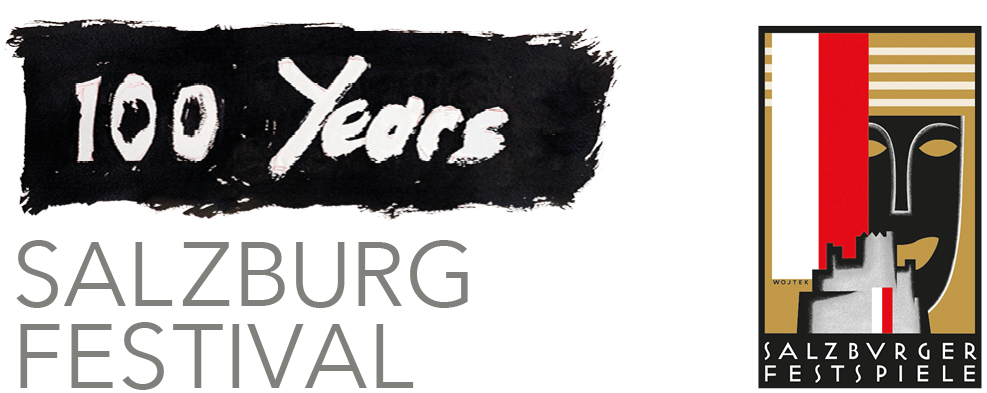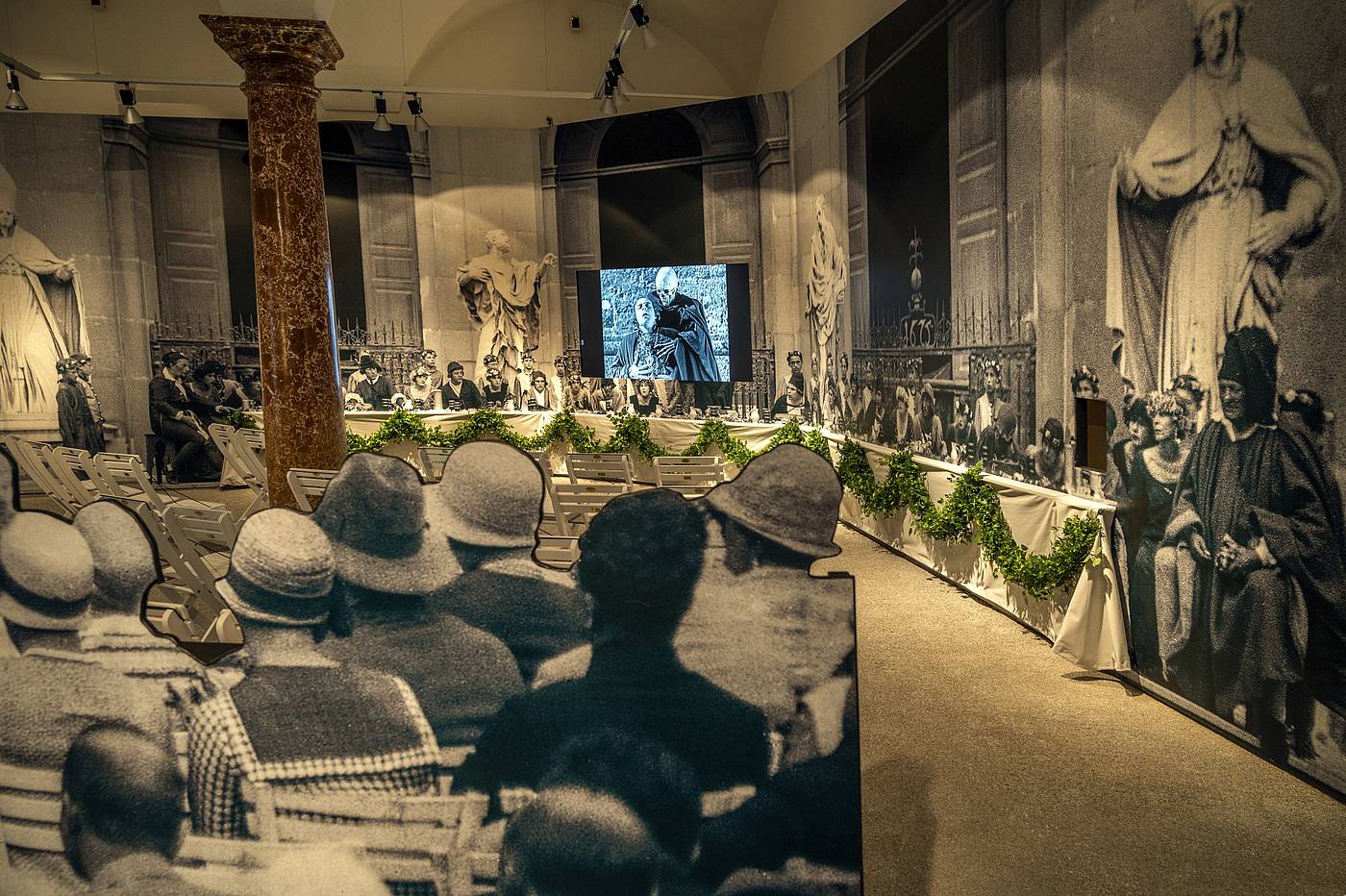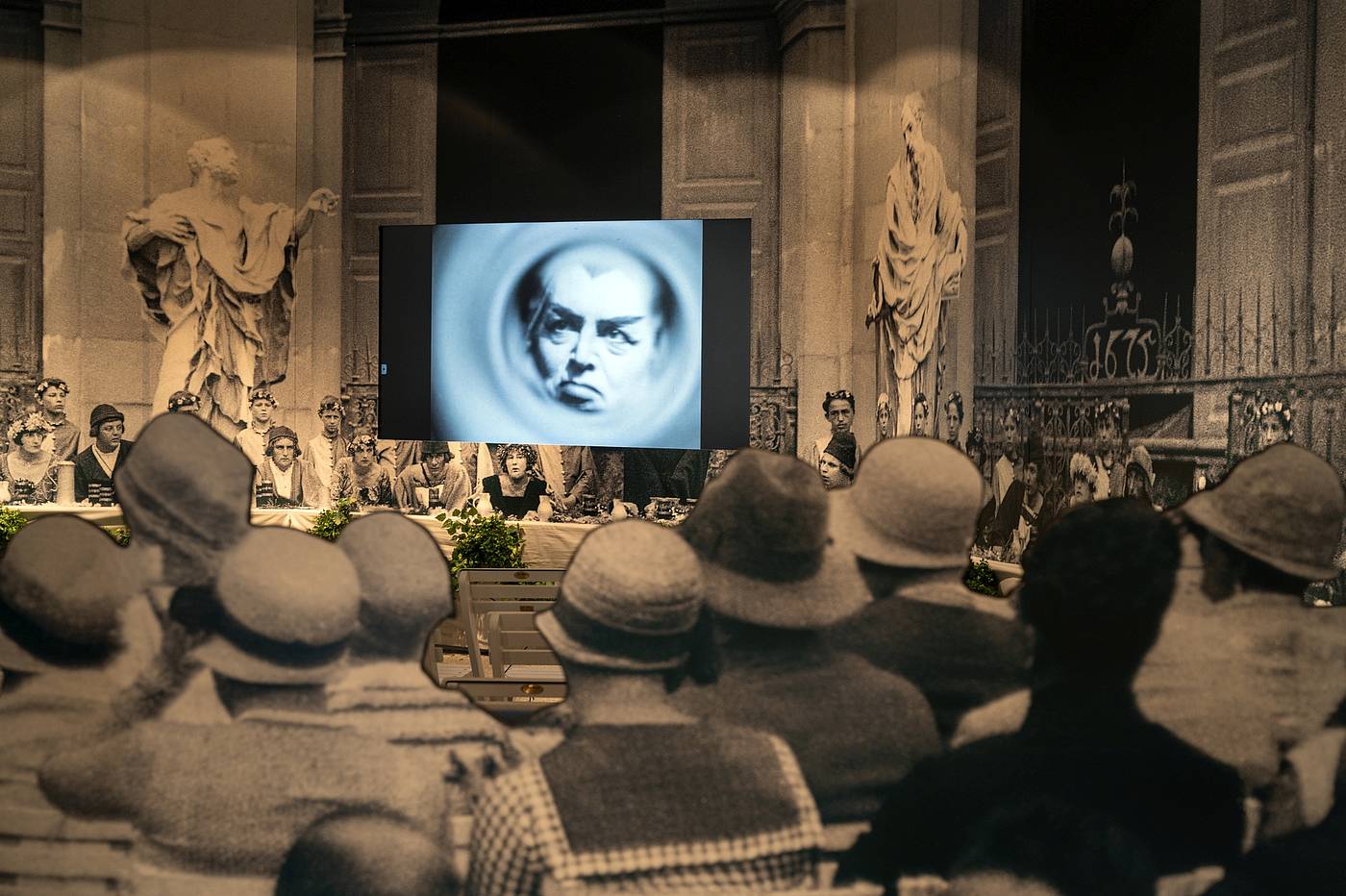26 JULY 2020 TO 31 OCTOBER 2021
NEUE RESIDENZ
MOZARTPLATZ 1
5010 SALZBURG
OPENING HOURS
Tue–Su 9–17
Contact:
secretariat
Gerlinde Kontschieder
+43-662-62 08 08-703
office@salzburgmuseum.at
guided tours
Sandra Kobel
+43-662-62 08 08-722 and 723
kunstvermittlung@salzburgmuseum.at
Head of Press & Marketing
Natalie Fuchs
Salzburg Museum
+43 662 620808-777
natalie.fuchs@salzburgmuseum.at
100 Years of the Salzburg Festival – a filmic introduction
Neue Residenz – Groundfloor
Stage set with cathedral façade and Everyman stage, films, folding chairs, wall tapestry and curtain
22 August 1920: The first performance of Hugo von Hofmannsthal’s Jedermann / Everyman directed by Max Reinhardt on Domplatz / Cathedral Square in Salzburg has gone down in history as the founding date of the Salzburg Festival. This is what the exhibition concept refers to. A historical photograph, elements of the set design and the Domplatz are transposed into the Säulenhalle / Column Hall of the Neue Residenz. At the same time, this configuration right at the start of the anniversary exhibition forms the framework for a filmic introduction to the Salzburg Festival. The documentary is a production of ORF (Austrian Broadcasting Corporation; edition: Werner Horvath) showing selected impressions from the 100 years of the Festival’s history.
Glossary
Hugo von Hofmannsthal (born in 1874 in Vienna; died in 1929 in Rodaun near Vienna) was an Austrian author, dramatist, poet, librettist and co-founder of the Salzburg Festival. His Jedermann / Everyman became the Festival’s trademark. With his play Das Salzburger grosse Welttheater / The Salzburg Great World Theatre and his libretti for several operas by Richard Strauss (including Der Rosenkavalier / The Knight of the Rose, Ariadne auf Naxos, Die Frau ohne Schatten / The Woman Without a Shadow) he forged himself a place not only in the history of the Festival but also in music theatre history.
Jedermann / Everyman – The Play of the Rich Man’s Death is a play by Hugo von Hofmannsthal. It premièred in 1911 in Berlin, directed by Max Reinhardt, and made Festival history in Salzburg. The play has been performed regularly since 1920. The only time it was not on the programme was between 1922 and 1925, and also during the Nazi period. Hofmannsthal based his Jedermann on a
Late Medieval morality play. The play is about the rich man Jedermann who is unexpectedly confronted by Tod / Death. Neither his Buhlschaft / Paramour and his Guter Gesell / Good Companion, nor his friends and his Mammon want to accompany him on his last journey. Through the appearance of Werke / Good Works and Glauben / Faith, Jedermann is converted and so escapes the Teufel / Devil. They accompany him when he steps before God’s judgement seat.
Max Reinhardt (born in 1873 in Baden, Lower Austria; died in 1943 in New York) was an Austrian stage and film director, artistic director, theatre producer and impresario. His Jedermann production on 22 August 1920 struck up the overture to the Salzburg Festival. After his training as an actor, Reinhardt worked as a successful stage director and theatre founder. A flamboyant personality of the German-language theatre, he was responsible for the Salzburg Festival’s first great zenith in the 1920s. By purchasing Schloss Leopoldskron,
Reinhardt was closely connected to Salzburg from 1918 to the 1930s. Adolf Hitler’s seizure of power in the German Reich in 1933 and Austria’s ‘Anschluss’ (annexation) to Nazi Germany in 1938 caused Reinhardt to lose his cultural home and his property. By 1937, he had already emigrated to the USA, where he died in 1943.
ORF is Austria’s public-law broadcasting corporation. Through its broadcasts of Salzburg Festival performances, it has had a formative influence on the public image of the Festival since the 1920s, both nationally and internationally. Moreover, ORF and its predecessor institutions, together with the Salzburg Festival, contributed much to the history of radio and television with multiple pioneer achievements. As early as 1925, a Festival performance was broadcast on Austrian radio by the Austrian radio broadcasting service of that time, ‘Österreichische Radio Verkehrs AG’ (RAVAG). A short time later there were broadcasts to Europe, and in 1931 to the USA. In 1958, ORF televised Jedermann for the first time, with Will Quadflieg in the title role. The recordings produced during this partnership have made the ORF archive today an audio-visual treasure trove of the Festival’s history.
Image gallery







